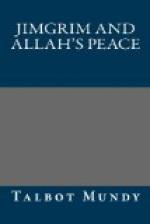Chapter Seventeen
“Poor old Scharnhoff’s in the soup.”
We ate a scratch dinner with the Daveys in their room and started forth. Grim as usual had his nerve with him. He led me and Suliman straight up to the three spies who were squatting against the wall, and asked whether there were any special regulations that would prevent my being left for the night in the famous mosque. On top of that he asked one of the men to show him the shortest way. So two of them elected to come with us, walking just ahead, and the third man stayed where he was, presumably in case Noureddin Ali should send to make enquiries.
You must walk through Jerusalem by night, with the moon just rising, if you want really to get the glamour of eastern tales and understand how true to life those stories are of old Haroun-al-Raschid. It is almost the only city left with its ancient walls all standing, with its ancient streets intact. At that time, in 1920, there was nothing whatever new to mar the setting. No new buildings. The city was only cleaner than it was under the Turks.
Parts of the narrow thoroughfares are roofed over with vaulted arches. The domed roofs rise in unplanned, beautiful disorder against a sky luminous with jewels. To right and left you can look through key-hole arches down shadowy, narrow ways to carved doors through which Knights Templar used to swagger with gold spurs, and that Saladin’s men appropriated after them.
Yellow lamplight, shining from small windows set deep in the massive walls, casts an occasional band of pure gold across the storied gloom. Now and then a man steps out from a doorway, his identity concealed by flowing eastern finery, pauses for a moment in the light to look about him, and disappears into silent mystery.
Half-open doors at intervals give glimpses of white interiors, and of men from a hundred deserts sitting on mats to smoke great water-pipes and talk intrigue. There are smells that are stagnant with the rot of time; other smells pungent with spice, and mystery, and the alluring scent of bales of merchandise that, like the mew of gulls, can set the mind traveling to lands unseen.
Through other arched doors, even at night, there is a glimpse of blindfold camels going round and round in ancient gloom at the oil-press. There are no sounds of revelry. The Arab takes his pleasures stately fashion, and the Jew has learned from history that the safest way to enjoy life is to keep quiet about it. Now and then you can hear an Arab singing a desert song, not very musical but utterly descriptive of the life he leads. We caught the sound of a flute played wistfully in an upper room by some Jew returned from the West to take up anew the thread of ancient history.




